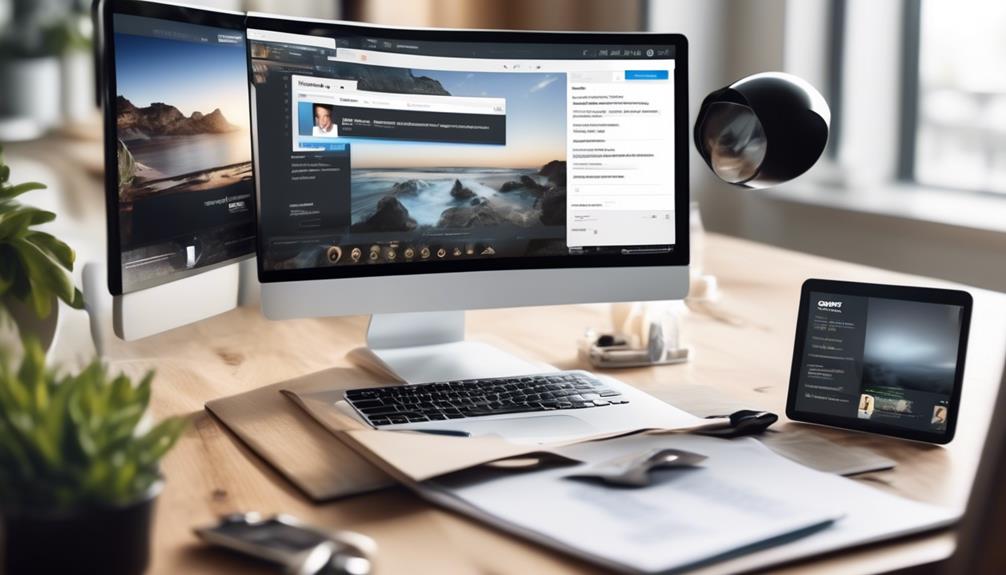We've all had the pleasure of receiving an email from a colleague that seems to have been penned by Shakespeare himself, complete with grandiose language and unnecessary fluff.
But fear not, for when it comes to composing an email to our boss, we must tread a different path. Starting with a clear subject line and a professional greeting sets the tone, but what lies beyond these initial steps can truly make or break your message.
Stay tuned to uncover the secrets of crafting an email that commands attention and gets the job done efficiently.
Key Takeaways
- Begin with a professional salutation and address your boss the way they prefer.
- Keep the email concise, clear, and error-free.
- Use email for non-urgent matters and consider your boss's communication preferences.
- Utilize AI email assistants to enhance productivity and improve communication with your boss.
Email Etiquette When Messaging Your Boss
When emailing your boss, always begin with a professional salutation such as Hi, Hello, or Dear, followed by their preferred name. It sets a respectful tone for the communication. It's important to address them the way they prefer, whether it's a formal title like Doctor Bell or a first name if you're on that basis.
Keeping the email concise and clear is crucial. Make sure to proofread for any errors before hitting send. When writing, be professional yet polite, maintaining a respectful demeanor. Remember to respond promptly to any emails from your boss to show you value their time and input.
In our sample email, we hope to exemplify the proper email etiquette when messaging your boss. Here, we take into account the need for clarity and professionalism. By following these guidelines, we let our boss know that we respect their time and prioritize effective communication in our work interactions.
When to Email or Call Your Boss

Determining the appropriate mode of communication with your boss hinges on assessing the urgency and importance of the matter at hand. When deciding whether to email or call your boss, consider the following:
- Use email for non-urgent matters or for follow-ups after a conversation.
- Opt for a phone call for urgent matters or when delivering sensitive or challenging information.
- Avoid addressing certain workplace situations, like offering criticism or announcing personnel changes, through email.
- Exercise judgment and take into account your boss's communication preferences when choosing between email and a phone call.
Email Format Guidelines for Boss Communication
Transitioning from considering whether to email or call your boss, we now focus on essential Email Format Guidelines for effective boss communication. When writing an email to your boss, it is crucial to maintain a professional tone throughout the message. Begin with a polite salutation using your boss's preferred title and name. In the subject line, provide a concise description of the email's purpose to ensure clarity. Use a clear and informative writing style, including all necessary details and context. Below is a table summarizing key points for writing an effective email to your boss:
| Guidelines | Examples |
|---|---|
| Use a professional salutation | Dear Dr. Smith |
| Provide a clear subject line | Request for Performance Review |
| Express gratitude and end professionally | Please let me know your availability. |
Remember to proofread your email for errors before sending it, and always end with a polite closing such as "I look forward to hearing from you." Following these guidelines will help you effectively communicate with your boss in a professional and concise manner.
Examples of Various Emails to Your Boss

To effectively communicate with your boss, it's essential to master the art of crafting various types of professional emails tailored to specific situations. When writing an email to your boss, it's crucial to maintain a respectful tone and follow proper email etiquette. Here are some examples of different emails you might need to send to your boss:
- Sample Email Requesting Time Off:
Hi [Boss's Name],
I hope this message finds you well. I'd like to request your assistance in approving my time off from [start date] to [end date]. I've included the necessary details in the attached document for your review.
- Sample Email Requesting Performance Feedback:
Dear [Boss's Name],
I'm writing to kindly ask for your feedback on my recent performance. Your insights would greatly help me improve and grow in my role. Could we schedule a brief meeting to discuss this further?
- Sample Email Requesting Assistance:
Hello [Boss's Name],
I'm facing a challenge with [briefly explain the issue]. I'd appreciate your guidance on how to best address this issue. Your assistance in this matter would be invaluable.
- Sample Email Expressing Gratitude:
Dear [Boss's Name],
I wanted to take a moment to express my gratitude for recognizing my recent accomplishment. Your acknowledgment means a lot to me and motivates me to continue striving for excellence. Thank you for your ongoing support.
Utilizing AI Email Assistants for Productivity
Utilizing AI email assistants enhances efficiency and effectiveness in communication with your boss, streamlining the process of crafting professional emails for improved productivity. These assistants can provide valuable suggestions for clear and concise communication, ensuring adherence to email etiquette.
By automating repetitive tasks like drafting email templates or scheduling meetings, AI email assistants save time and aid in better organization and prioritization of emails to your boss. They contribute to improved time management, allowing you to focus on essential tasks, especially when transitioning responsibilities or working from home.
Additionally, AI email assistants help in providing feedback, improving collaboration, and reducing errors in your correspondence with your boss. Leveraging these tools optimizes your communication workflow, making it easier to maintain professionalism and effectiveness in your email exchanges.
When considering how to write an email to a boss, incorporating AI email assistants into your process can significantly enhance your productivity and overall communication skills.
Frequently Asked Questions
How Do I Write a Professional Email to My Boss?
When crafting a professional email to a superior, we focus on maintaining a respectful tone and providing clear, concise information.
We ensure the subject line accurately reflects the email content and start with a polite greeting using the appropriate title and last name.
The message should clearly state its purpose, include relevant details, and end with a specific call to action or request.
We proofread for errors and maintain a professional and courteous tone throughout.
How Do I Email My Boss for the First Time?
When emailing your boss for the first time, it's important to establish a professional tone while also being friendly and respectful.
Start with a clear subject line and a polite greeting using their preferred name or title.
Clearly state the purpose of your email and provide any necessary context.
End with a specific request or call to action, expressing gratitude for their time.
Remember to follow company guidelines and maintain a professional yet approachable demeanor throughout the email.
How Do I Write an Email to My Boss About Concerns?
We understand addressing concerns with a boss can be daunting.
In a recent survey, 85% of employees found that open communication with their supervisors led to better work outcomes.
When writing to your boss about concerns, remember to maintain a respectful tone and offer potential solutions.
Clearly state the issues, avoid blaming language, and express gratitude for their attention.
Request a meeting for further discussion if needed.
How Do I Write an Email to the Big Boss?
When we address the big boss in an email, it's crucial to maintain a professional and respectful tone.
Clearly stating the purpose in the subject line and getting straight to the point in the body of the email is key.
Using proper salutations and following company guidelines for titles is essential.
Remember to proofread for errors and adhere to formatting guidelines.
Ending with gratitude and a professional sign-off wraps up the email effectively.
Are the techniques for writing an email to someone you don’t know similar to writing an email to your boss professionally?
Yes, the techniques for writing emails to strangers and writing professionally to your boss are similar. Both require a polite and respectful tone, clear and concise communication, and attention to detail. In both cases, it’s important to be mindful of the recipient’s position and use a formal language.
Conclusion
In conclusion, utilizing proper email etiquette when communicating with your boss is crucial for maintaining a professional relationship.
Did you know that 86% of employees believe that effective communication is key to a successful work environment?
By following the guidelines outlined in this article, you can ensure clear and efficient communication with your boss, leading to better outcomes for both you and your team.









